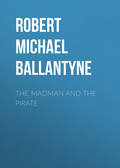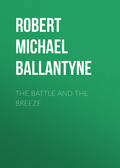
Robert Michael Ballantyne
The Fugitives: The Tyrant Queen of Madagascar
Towards the afternoon the party arrived at the native village, where grand preparations for festivities had been made. It was evident also that some parts of the festive libations had been taken in advance, for the head-man had reached the solemnised point of intoxication, and some of his young men the owlish condition.
In some parts of this island of Madagascar, as in other parts of the world, the people reduced themselves to great poverty through strong drink. Though they had abundance of rice, and much beef, which latter was salted for exportation, they sold so much of their food for arrack—imported by traders from Mauritius and Bourbon—that little was left for the bare maintenance of life, and they, with their families, were often compelled to subsist on roots. They did not understand “moderate drinking”! Intoxication was the rule until the arrack was done. The wise King Radama the First attempted to check the consumption of ardent spirits by imposing a heavy duty on them, but his efforts were only partially successful.
The tribe to which our travellers were at this time introduced had just succeeded in obtaining a quantity of the coarse and fiery spirits of the traders. Their native visitors being quite ready to assist in the consumption thereof, there was every prospect of a disgusting exhibition of savagery that night.
“Don’t you think we might escape this feast?” said Mark to the guide, after the ceremony of introduction was over, “by urging the importance of our business at Antananarivo?”
“Not easily. Voalavo is one of those determined and hearty men who insist on all their friends enjoying themselves as they themselves do. To-morrow we may persuade him to let us go. Besides, I do not object to stay, for I intend to preach them a sermon on ungodliness and intemperance in the middle of the feast.”
Mark could scarcely forbear smiling at what he deemed the originality of the guide’s intention, as well as the quiet decision with which he stated it.
“Don’t you think,” he said, “that this way of bearding the lion in his den may rouse the people to anger?”
“I know not—I think not; but it is my business to be instant in season and out of season,” replied Ravonino, simply.
Mark said no more. He felt that he had to do with a Christian of a somewhat peculiar type, and thereafter he looked forward with not a little curiosity and some anxiety to the promised sermon. He was doomed, like the reader, to disappointment in this matter, for that night had not yet run into morning when an event occurred which modified and hastened the proceedings of himself and his friends considerably.
Chapter Eleven.
An Uninvited Guest appears with News that demands Instant Action
The villagers and their guests were still in the midst of the feast, and the arrack had not yet begun to stimulate their imaginations, so that the deeds of their ancestors—which formed the chief subject of conversation—were still being recounted with some regard to modesty and truth, when Voalavo said to the assemblage, with a beaming countenance, that he had a treat in store for them.
“You are all fond of music,” he said. “Who does not know that the Malagasy are good singers? The songs you have already sung have delighted my ears, and the clapping of your hands has been in the best of time; but you shall soon have music such as the idols would enjoy, I have no doubt, when in a merry mood.”
The chief uttered the last sentence with an air of good-natured contempt, for he was what we may style an unbeliever in all gods—not an uncommon state of mind in men of superior intelligence when they think seriously of the debasing absurdities of idolatry.
“Now, my friend,” he said, turning to John Hockins, with an air and tone of command, “let them hear the little pipe on which you—you—tootle-ootle.”
Hockins had much ado to keep his gravity as he drew out the flageolet, and every eye was instantly fixed on him in glaring expectancy.
It need hardly be said that the effect of the sweet instrument was very powerful, and it is probable that the party of admirers might have taxed the seaman’s powers of performance to the uttermost, if they had not been suddenly interrupted by the entrance of a tall wild-looking man, who was evidently in a state of tremendous excitement.
He wore the usual cloth round the loins, and the lamba, which was thrown like a Scottish chieftain’s plaid over his left shoulder—but these garments bore evidence of rough usage and hard travel. The man was not a stranger, for, as he suddenly stood panting vehemently in the midst of the party, with his long arms outstretched, Voalavo addressed him in tones of surprise.
“Razafil!” he exclaimed. “Glad are we to see the Bard of Imarina. Your coming is well-timed. We are feasting, and singing, and story-telling. Words from the poet will be welcome.”
Notwithstanding the friendly reception thus accorded to the Bard of Imarina, it was evident that the words were thrown away upon him, for he continued for some time to glare and pant while perspiration rolled down his face, and it became clear to every one that something was wrong with him. At last he spoke in a kind of low singing tone which harmonised with his appearance—
“Vain man! Observ’st thou not the dead?
The morning warmth from them has fled,
Their mid-day joy and toil are o’er,
Though near, they meet fond friends no more.”
He paused and looked wildly yet tremblingly round, as if in search of some one, but took no notice of his friends, many of whom were present at the gathering. Then he continued in the same strain—
“A gate of entrance to the tomb we see,
But a departure thence there ne’er shall be.
The living waves his signal high,
But where’s the loved one’s fond reply?
Ah! where are those thus doomed to die?
“Vain man! observ’st thou not the dead?
No more their homeward path they tread.
The freeman lost may ransom’d be,
By silver’s magic power set free;
But, once the deadly hand has laid them low,
No voice can move them, for they cease to know.
Regardless of our love they lie;
Unknown the friends that o’er them sigh;
Oh! where are those thus doom’d to die?”
Again the poor man paused, and gasped as if some terrible agony were rending his bosom, yet no tear moistened his eyes, from which there seemed to gleam the wild light of insanity. His appearance and words had sunk like a pall upon the festive party, but no one spoke or moved. It was as if they were spell-bound. Once more the poet spoke, and this time in tones of deepest pathos—
“Vain man! why groan ye for the dead?
To be with Jesus they have fled,
With shattered limbs—’mid scorching flame,
They sang the praises of His name;
Now, joy unspeakable, they tread the shore
Whence ransom’d sinners shall depart no more.
But ah! while mangled corpses lie,
Our trembling, riven hearts will cry—
‘Why, why were those thus doom’d to die?’”
The man ceased; his arms fell listlessly by his side, and his chin sank on his breast.
“I fear much,” whispered Ravonino to Mark, “that I understand but too well what he means.”
Without waiting for a reply the guide rose. Going up to Razafil he laid his hand gently on his arm, and said—
“My brother!”
The bard looked at him earnestly for a few seconds, then, grasped him by the wrist as with a grip of iron.
“Ravoninohitriniony,” he said, fiercely, “my little one is dead! She is gone! They took her—a mere child—they tortured her, but she would not yield. Hear what I say. You knew her well—the soft one; the tender one, who was always so pliable, so unselfish, so easily led,—she would not yield! They led her to the place of execution; they tied her to a stake and kindled the fire about her beautiful limbs,—my little child, Raniva! I saw the skin upon her flesh blacken and crack and blaze. But she sang! sang loud and clear! I would have rushed into the fire to her but they held me back—four strong men held me! When she was consumed they led me away to the torture—but I burst from them—escaped—I know not how—I care not! for my little one is lost!—lost!—”
“Nay, Razafil—not lost!” said Ravonino, in a quiet but firm tone, for he saw the gleam increasing in the poor father’s eyes. “Did you not say just now that she is singing with joy unspeakable the praises of His name?”
The words were fitly spoken. The father’s agonised soul was quieted, but as quietness partly returned to him, a new expression appeared on his countenance.
“Listen,” he said, still holding the guide’s wrist in his powerful grasp. “I go to my poor wife. She is safe in the cave with Réni-Mamba—”
“Not in the cave you think of,” interrupted the guide, explaining the change of abode which had been recently made by the Christian fugitives.
“No matter,” returned the bard, “I know all the caves, and can find the one she has gone to. But now I must warn you—warn all of you who are Christians,” he added, with emphasis, looking round upon the natives, “if there be any such among you—that Queen Ranavalona has got one of her bad fits again. She has ordered that no one is to sing or pray to Jesus, or to read the Word of God, on pain of imprisonment, death, or being sold into slavery. Many have been sold already, and some have died. Things would have been even worse, for the English missionary has left Antananarivo, but Prince Rakota remains our friend. Still, he cannot save every one. He could not save my Raniva! Now,” he added, turning to the guide abruptly, as if anxious to keep his mind from dwelling on his terrible bereavement, “you must go to Antananarivo with all haste if you would save Rafaravavy, for she is in great danger.”
The bard had touched a cord in Ravonino’s breast which vibrated sensitively.
“She has not confessed? She is not in prison?” he asked, quickly, with emotion which was too powerful to be entirely suppressed.
“As to confessing,” returned Razafil, “there is no need for her to do that, for it is well-known that she is a Christian; but the queen is fond of her and wishes to spare her. Nevertheless, she is so exceeding mad against us just now, that there is no saying when her forbearance may come to an end. If you would save Rafaravavy, you must get her out of the palace without delay.”
The guide did not reply for a few seconds. It was evident, from the knitted brows and the pallor of his countenance, that he was endeavouring to make up his mind to some course of action. Suddenly the frown passed from his brow, his countenance became perfectly calm, and his eyes closed.
“He is speaking with God,” whispered Laihova to one who sat near him.
Laihova may have been right. If so, the prayer was a very brief one, for the guide turned almost immediately to Voalavo and explained that in the circumstances it was absolutely necessary for him and his comrades to depart at once for the capital.
The chief, being a sympathetic as well as a hilarious soul, made no objection, but rather urged him to make haste.
Ravonino then turned to his white companions, who could, of course, only guess at the meaning of all that had been said, and explained to them the whole matter. They rose at once, and, having no preparations to make, professed to be ready to start there and then.
Now, while they were yet speaking, the festive party received another surprise, or alarm, which was even more exciting than the previous one.
A young man suddenly burst into the village with the announcement that a body of the Queen’s soldiers were close at hand. They had been sent off in pursuit of Razafil, with directions to scour the country, and bring in as many Christian fugitives as possible, and he—the young man—being a fast runner, had been sent in advance by some friends of the bard to warn him of his danger.
“I would not try to avoid them if I stood alone,” said Razafil, softly. “Should I shrink from dying for Jesus, after seeing my Raniva go to Him in a chariot of fire? But I stand not alone. My wife claims my support, and my little boy.”
While he was speaking, it was seen that a few of the hunters, as well as one or two inhabitants of the village, rose quietly and left the place. These were either professing or suspected Christians, who were anxious to make their escape from the danger that threatened.
After bidding Voalavo farewell, the guide and his friends left the village and struck into the woods. They were accompanied by the bard a short distance, until a point was reached where their routes diverged, and here, after a few words of brotherly sympathy and counsel from Ravonino, the bereaved man went on his solitary way, and the others directed their course towards the capital.
“Poor man,” said Ebony, who looked over his shoulder with profound sorrow in his earnest eyes as long as the tall figure of the bard was in sight, “I’s most awrful sorry for ’im. Why don’t dey hang Randalvalona, or shot ’er?”
“History teaches that it’s not always so easy as one might think to get rid of objectionable queens in that way,” said Mark.
“Hm! I’d teach history suffin diff’rent if I had my way,” returned the negro.
“But surely the great men around her might have some sort o’ power to clap a stopper on ’er?” said Hockins.
“They have some power, but not much,” returned the guide, “for Ranavalona is a passionate, self-willed, cruel woman; and when such a woman happens to be a despotic queen, nothing short of a revolution, or her death, can save the country. She usurped the throne in 1829, we have now reached 1857, so she has been reigning more than twenty-seven years, and a bitter reign it has been. There have been many persecutions of the Christians since it began. Hundreds have been slain; thousands have been sold into slavery; many more have been banished to pestilential districts, where disease has laid them low. God grant that this mad fit may not be the forerunner of another burst of cruelty.”
“But do you really think,” said Mark, “that Rafaravavy is in great danger? Did not the bard say that she is a favourite with the queen?”
“That is some security, but not much, for Ranavalona is changeable as well as cruel. But my dear one is in the hands of God. No harm can come to her unless He permits. Nevertheless, our God works not by miracles but by means, therefore it is my business, having the opportunity given me, to hasten to her rescue.”
“And it is mine to help you,” said Mark, an impulse of youthful enthusiasm and sympathy swelling his heart as his mind suddenly reverted to the morning when he left England, and said his last good-bye to the fair one with the golden hair and the rosebud mouth and “such lovely blue eyes!”
“But how,” he continued, “shall we best aid you in this matter?”
“That question I cannot answer immediately. When we draw near to the capital and hear what is going on I shall be able to form a plan. What we have to do just now is to travel fast. You are strong stout men, all of you. Do you think you can walk fast and far with little rest or sleep, and without breaking down?”
“I think so,” answered Mark, modestly.
“I’s cock-sure ob it,” said Ebony, “if we’s allowed lots o’ grub.”
“I’m not quite so sure,” said Hockins; “you must remember I’ve only got sea-legs on—but I’ll try.”
And he did try, and so did the others; with such success, too, that before the sun set that evening they had penetrated into the very heart of the mountain range which runs through the centre of the island.
There had not been much conversation on the way, for hill-climbing all day at top-speed is not compatible with small talk. Besides, the obvious anxiety of Ravonino rendered his companions less inclined than usual to engage in desultory remarks. Nevertheless there were occasions—during momentary halts to recover breath, or when clear bubbling springs tempted them to drink—when the prolonged silence was broken.
“Putty stiff work dis hill-climbin’, massa,” said Ebony, during one of these brief halts, as he wiped the perspiration from his sable brow with the back of his hand. “Lucky I’s used to it.”
“Used to it?” repeated Mark.
“Yes. Di’n’t I tell you I was born an’ raised among de Andes in Sout’ Ameriky?”
“To be sure, I forgot that, but there must be a considerable difference between the two mountain ranges.”
“Das troo, massa, but de diff’rence don’t make much diff’rence to de legs. You see, wild rugged ground much de same wheder de mountains rise a few t’ousand foot, like dese, or poke der snow-topped heads troo de clouds right away up into de blue sky, like de Andes. Rugged ground is rugged ground, an’ hard on de legs all de same, an’ dis am rugged ’nuff even for ’Ockins!”
The negro opened his huge mouth in an amiable laugh at his companion, who had taken advantage of the brief halt to give a hearty rub to his colossal limbs.
“Rugged enough it is, no doubt,” said the sailor, gravely, “an’ it makes my sea-legs raither stiffish. But never you fear, Ebony; they’re tough, an’ will last as long as yours, anyhow.”
“You’s right, ’Ockins. Dey’ll last longer dan mine by eight or ten hinches—if not more.”
“Your jokes are small, Ebony, which is more than can be said for your mouth. Shut it, man, or some of us’ll go tumblin’ into it by accident.”
While these two were indulging their little pleasantries, the guide and his friend Laihova had gone to the top of a neighbouring bluff to consult as to the best route to adopt in the present troubled state of the country.
The view from the commanding height on which they stood was indeed marked by a rugged grandeur which might have done credit even to the giant Andes themselves, and offered a variety of routes, or rather obstructions to routes, which might well perplex men who were eager to cross country swiftly.
The point which they had reached, and much of the range they had crossed, was formed of basalt in various stages of decomposition; but in the country before them, for several miles in advance, huge masses of granite and fragments of quartz indicated a change in the nature of the prevailing rock. The position of these masses, as well as their size, gave a wild Titanic aspect to much of the scenery.
Many enormous stones projected out of the ground at various angles. One of these stood out horizontally to the distance of between twenty and thirty feet, forming a cave under it, in which it was evident, from sundry suggestive appearances, that wayfarers were accustomed to lodge. The neighbourhood of this cave formed one of the most romantic and picturesque scenes they had yet seen. It was a dark narrow vale, in many places not less than five hundred feet deep, with a considerable stream at the bottom, which brawled among detached and shattered rocks, or was partly lost to view in its meanderings among the beautiful green shrubs which clothed its banks. Various kinds of birds twittered among the bushes, and wherever water expanded in the form of pond or lakelet numerous waterfowl sported on the surface.
“A glorious prospect!” exclaimed Mark, as he joined the guide and his friend, “and a splendid place, I should think, for fugitives from persecution.”
He pointed, as he spoke, to the scene on his right, where masses of rock varying from thirty to fifty feet in length projected from the side of the ravine. On the top of these rested other masses in a position that seemed to threaten destruction to all who ventured beneath them.
“The caves of this region,” said the guide, “have served to shelter the Christians many a time. It looks as if God had provided these blocks of granite for this very purpose, for the caverns which extend beneath them are dark and intricate, having many entrances, and being lighted in some places by openings between the blocks, while in other places they are profoundly dark and of unknown extent. See also, if you look at the stream below, they form a splendid bridge. At this distance they do not seem large, but some of these blocks are not less than a hundred feet long. This whole region is infested by robbers, but the recent act of the Queen in sending troops out to scour the country for fugitive Christians seems to have driven them away. But if they had been here we should have had little to fear, for robbers are not usually fond of attacking even small parties of men who are well able to defend themselves; besides, they do not injure the outlawed Christians much. Perhaps they have a sort of fellow-feeling for us!”
At this point Laihova spoke a few words to the guide in the native tongue. The latter nodded approval, and turning to Mark, said—
“We have been consulting about our route. There are two roads—one rugged, round-about, and safe, which would take us a longer time, however, to reach the capital than the other, which is the regular beaten path, through the villages. But this latter way lays us open to the danger of meeting with soldiers, and of my being captured along with my friend Laihova. There would be no danger to you and your friends, for you are strangers.”
“Ravonino,” said Mark, quickly, “do what is best for rescuing Rafaravavy. We have no will but yours. We will follow wherever you choose to lead.”
A quiet look of satisfaction played on the guide’s features as he turned to his friend.
“What says Laihova? The Englishmen are willing to do whatever we wish.”
“Let us go by the villages. Let us push on by night as well as by day,” said Laihova. “Time flies! Ranavalona is mad! Rafaravavy is in danger!”
It was finally arranged that, at this place, which was considerably to the south of Antananarivo, they should diverge to the right, so as to avoid certain points of danger, and arrive ultimately at the eastern side of the capital.
Having settled this point, the three men rejoined their comrades, who were still conversing amicably beside the spring. Thereafter they all descended into the valley by a steep and rugged pathway.







